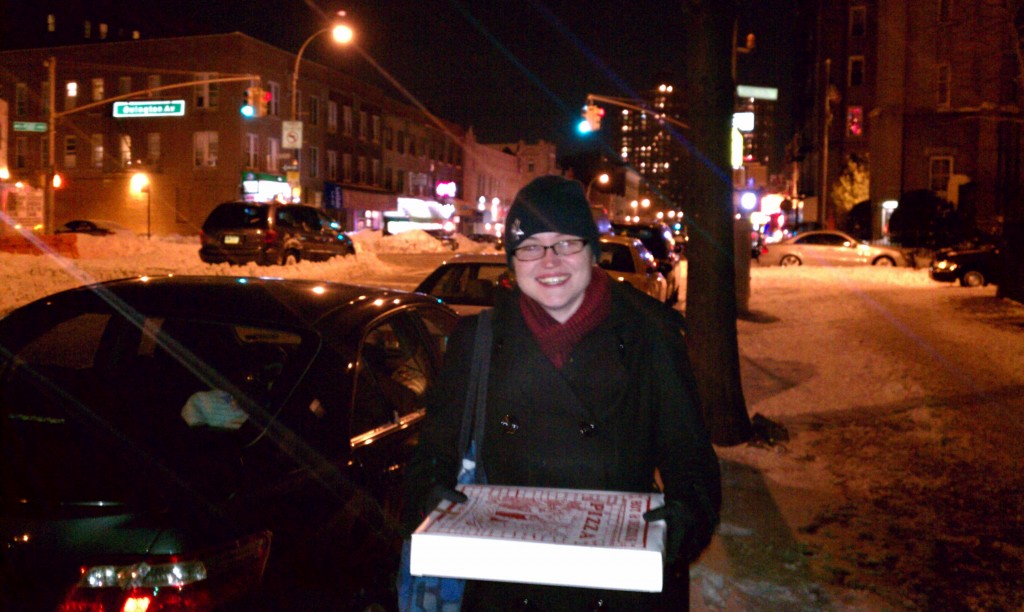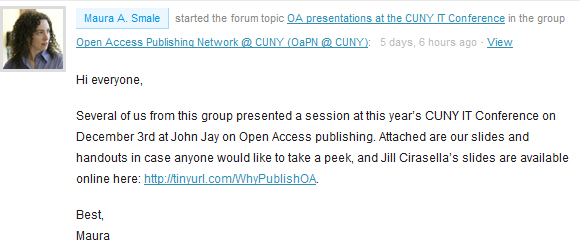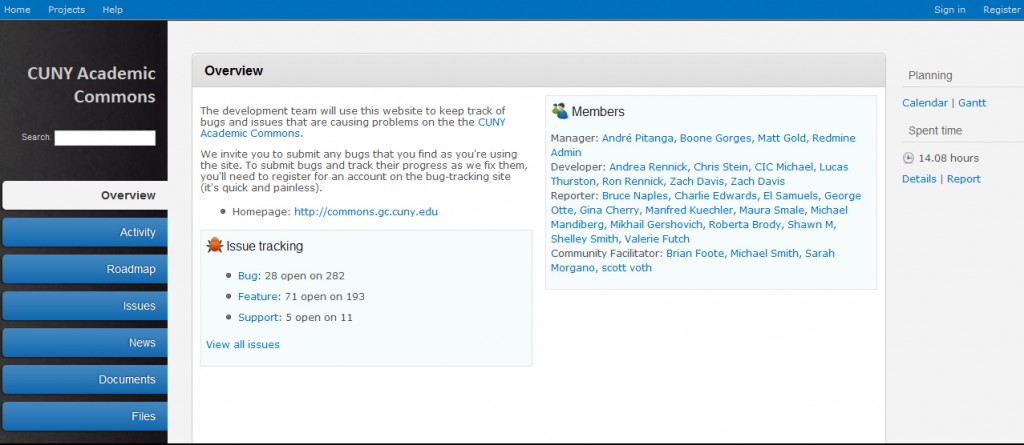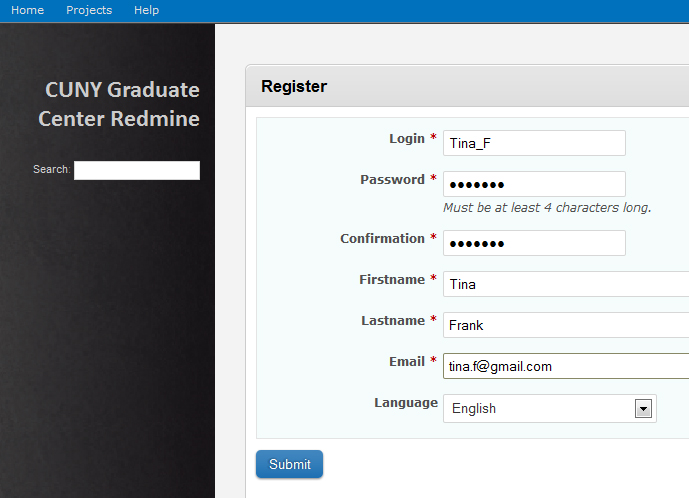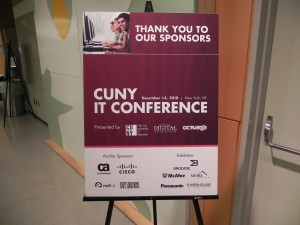
9th Annual CUNY IT Conference
I highly enjoyed day 2 of the CUNY IT conference and it wasn’t just because it was held on my home turf at the Graduate Center (although it was nice being able to leave my coat in my office!) What I enjoyed the most about these sessions was that that I knew a little about most of the topics presented and presenters themselves — in part because of the CUNY Academic Commons. A couple examples include the “CUNY Online Composition Pilot: A New Model of Collaborative Course Development” and “Get in the Game: Games to Support Teaching and Learning at CUNY”. It was also great helping new members create accounts and meeting some CUNYs face-to-face for the first time after interacting online via the Commons. What was super sweet was that I already knew a little about their work and academic interests through blog posts, profile details, forum posts, wiki edits, etc… (Try to fit all of that on a nametag!)
Unfortunately, registration filled up pretty quick for day 2 so not as many folks were able to come as would have liked to. While I wasn’t able to do what I really wanted to do – split myself into seven Morgano’s to attend each session – I did take some notes on the sessions that I was able to attend. There were also flurries of tweets about the conference marked with the hashtag #cunyit for your viewing pleasure.
After stopping for some much needed morning java, I headed over to Room C204 with fellow Common Community Team member Boone B. Gorges (@boonebgorges) for a dual presentation:
- Education Faculty Perspectives towards Teaching Online, by Helen Mele Robinson (@profhmr); and
- Honorable Technology: Towards a Digital Honors Code, by Joe Ugoretz (@jugoretz).
Helen’s presentation focused on Education faculty attitudes towards teaching online. Helen discussed the results from Sloan’s seventh annual report on the state of online learning in U.S. higher education, highlighting that while the number of programs and courses taught online continued to grow, acceptance by faculty has not changed. She also noted the difference between asynchronous courses (wholly online) and hybrid courses (blend of online & face-to-face).
Helen went on to discuss the results from a survey that she conducted at the City University of New York and Indiana University. Using the Likert Scale, Survey Monkey was utilized to measure 109 Education faculty participants’ beliefs and attitudes about teaching online. While Helen will be sending the full results to interested CUNYs via email, I was able to note some general results — among which show motivators and barriers for teaching online. Faculty indicated that motivators include benefits to both their students and their institution, and the flexibility of an online course. Barriers include lack of time for course design and lack of tech support. Additional effort seemed to be the biggest deterrent among surveyed faculty.
Faculty and staff in the room universally agreed that an online course is more time consuming than a face-to-face course and concerns were raised about the impact that teaching online might have on tenure. I was saddened to hear that many faculty had to downplay their technical skills while going through the tenure process because they feared it would not be viewed favorably.
Helen wrapped up her session by offering some suggestions to help garner Education faculty support for online instruction. In addition to supplying robust technical support and lowering enrollment caps for online classes, Helen suggested that not teaching 100% online would be a way to break stigmas associated with online instruction.
The second part of the dual presentation was by Joe Ugoretz, Associate Dean of Teaching, Learning, and Technology at Macaulay Honors College. Joe discussed recent incidents with Macaulay students involving cyber bullying and wiki vandalism which prompted the creation of a “Digital Honors Code”. After a positive response from students who were sent information about the Digital Honors Code via email, Macaulay IT Fellows engaged with students, faculty, and advisors to make amendments to the honors code, create guidelines for online behavior, and generate case studies. To make the honors code more open and community-based, the materials were put online in Fall 2010.
Recognizing that there are different impulses and temptations online, Joe split the room up into teams and charged each team with reviewing a case study and offering suggestions on how to handle the situation. My team chose “The Difficult Prof” and suggested that the student reach out to the student ombudsman, their advisor, or the academic director of their program instead of tweeting about how terrible their teacher was. Someone brought up that the tweet could have also been picked up by CUNYFail, a twitter account dedicated to retweeting others tweets about “CUNY’s failures”. Incidentally, one of my earlier tweets from the session was retweeted by CUNYFail – doheth!

Joe ended his session by asking everyone in the room how they would get students to participate in the Digital Honor Code site and one of my favorite suggestions was to ask students to develop a collaborative honors code contract.
What I loved about these presentations was that both Helen and Joe really engaged everyone through discussions and activities. Most definitely not a CUNYFail!
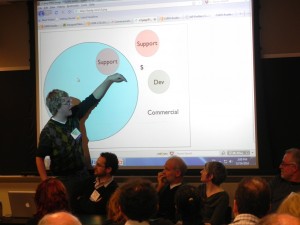
Boone B. Gorges discusses key distinctions of open source during the “Building Communities on the CUNY Academic Commons” session.
After listening to a terrific keynote presentation by Virginia Heffernan (peppered with wonderful ethnographic metaphors), taking some pictures, and getting my lunch on, I attended the “Building Communities on the CUNY Academic Commons” roundtable session. Charlie Edwards (@cedwards) did a great job of showing how groups can create resources inside of the Commons (ie: blogs, wikis, forums) and connect them to resources outside of the Commons (ie: Twitter and Gowalla). Overall, it was great to hear similar perspectives from people with different roles on the Commons — which was echoed by George Otte (@gotte) when he wrapped up the session with the stimulating statement: “Generativity doesn’t happen without openness.”
Following that energizing session I hung out with fellow Community Facilitators Brian Foote (@brianfoote) and Scott Voth (@scottvoth) at the CUNY Academic Commons sign-up tables, where we engaged in a lively discussion about ways to enhance the overall experience for members on the Commons (i.e. – highlighting our new Codex/Community Portal blog on the homepage). On that note — If you have suggestions about features you would like to see on the Commons or want to learn more about an existing feature, please don’t hesitate to contact the Community Team.
Overall, I have a terrific experience with day 2 and I’m already looking forward to the 10th Annual CUNY IT Conference! Did you attend day 2?? Share your experience below by leaving a comment or better yet – write about it on your blog!
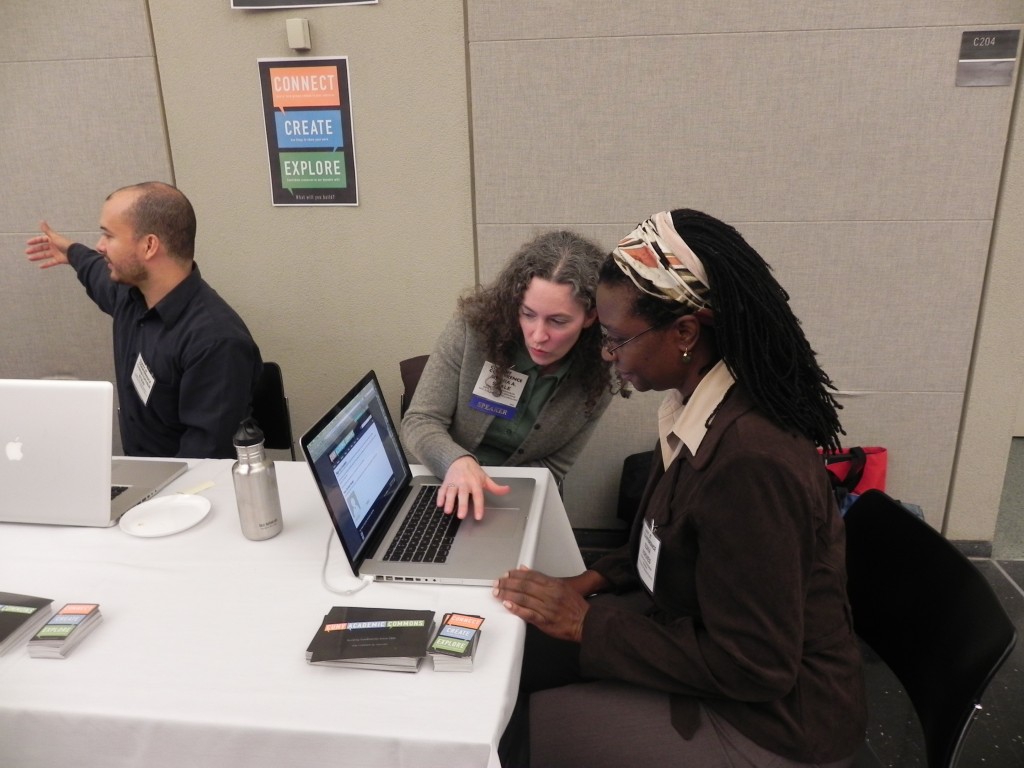
Maura A. Smale (@msmale) helps a fellow CUNY sign up for the Commons.
